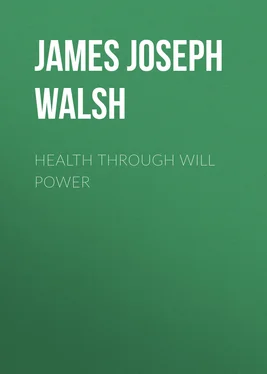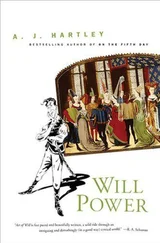James Walsh - Health Through Will Power
Здесь есть возможность читать онлайн «James Walsh - Health Through Will Power» — ознакомительный отрывок электронной книги совершенно бесплатно, а после прочтения отрывка купить полную версию. В некоторых случаях можно слушать аудио, скачать через торрент в формате fb2 и присутствует краткое содержание. Жанр: foreign_prose, psy_theraphy, foreign_edu, foreign_antique, на английском языке. Описание произведения, (предисловие) а так же отзывы посетителей доступны на портале библиотеки ЛибКат.
- Название:Health Through Will Power
- Автор:
- Жанр:
- Год:неизвестен
- ISBN:нет данных
- Рейтинг книги:5 / 5. Голосов: 1
-
Избранное:Добавить в избранное
- Отзывы:
-
Ваша оценка:
- 100
- 1
- 2
- 3
- 4
- 5
Health Through Will Power: краткое содержание, описание и аннотация
Предлагаем к чтению аннотацию, описание, краткое содержание или предисловие (зависит от того, что написал сам автор книги «Health Through Will Power»). Если вы не нашли необходимую информацию о книге — напишите в комментариях, мы постараемся отыскать её.
Health Through Will Power — читать онлайн ознакомительный отрывок
Ниже представлен текст книги, разбитый по страницам. Система сохранения места последней прочитанной страницы, позволяет с удобством читать онлайн бесплатно книгу «Health Through Will Power», без необходимости каждый раз заново искать на чём Вы остановились. Поставьте закладку, и сможете в любой момент перейти на страницу, на которой закончили чтение.
Интервал:
Закладка:
Here, then, is a wellspring of vitality that checks for a time at least even lethal changes in the body and undoubtedly is one of the most important factors for the prolongation of life. It represents the greatest force for health and power of accomplishment that we have. Unfortunately, in recent years, it has been neglected to a great extent for a number of reasons. One of these has been the discussions as to the freedom of the will and the very common teaching of determinism which seemed to eliminate the will as an independent faculty in life. While this affected only the educated classes who had received the higher education, their example undoubtedly was pervasive and influenced a great many other people. Besides, newspaper and magazine writers emphasized for popular dissemination the ideas as to absence of the freedom of the will which created at least an unfortunate attitude of mind as regards the use of the will at its best and tended to produce the feeling that we are the creatures of circumstances rather than the makers of our destiny in any way, or above all, the rulers of ourselves, including even to a great extent our bodily energies.
Even more significant than this intellectual factor, in sapping will power has been the comfortable living of the modern time with its tendency to eliminate from life everything that required any exercise of the will. The progress which our generation is so prone to boast of concerns mainly this making of people more comfortable than they were before. The luxuries of life of a few centuries ago have now become practically the necessities of life of to-day. We are not asked to stand cold to any extent, we do not have to tire ourselves walking, and bodily labor is reserved for a certain number of people whom we apparently think of as scarcely counting in the scheme of humanity. Making ourselves comfortable has included particularly the removal of nearly all necessity for special exertion, and therefore of any serious exercise of the will. We have saved ourselves the necessity for expending energy, apparently with the idea that thus it would accumulate and be available for higher and better purposes.
The curious thing with regard to animal energy, however, is that it does not accumulate in the body beyond a certain limited extent, and all energy that is manufactured beyond that seems to have a definite tendency to dissipate itself throughout the body, producing discomfort of various kinds instead of doing useful work. The process is very like what is called short-circuiting in electrical machinery, and this enables us to understand how much harm may be done. Making ourselves comfortable, therefore, may in the end have just exactly the opposite effect, and often does. This is not noted at first, and may escape notice entirely unless there is an analysis of the mode of life which is directed particularly to finding out the amount of exertion of will and energy that there is in the daily round of existence.
The will, like so many other faculties of the human organism, grows in power not by resting but by use and exercise. There have been very few calls for serious exercise of the will left in modern life and so it is no wonder that it has dwindled in power. As a consequence, a good deal of the significance of the will in life has been lost sight of. This is unfortunate, for the will can enable us to tap sources of energy that might otherwise remain concealed from us. Professor William James particularly called attention to the fact, in his well-known essay on "The Energies of Men", that very few people live up to their maximum of accomplishment or their optimum of conduct, and that indeed " as a rule men habitually use only a small part of the powers which they actually possess and which they might use under appropriate conditions. "
It is with the idea of pointing out how much the will can accomplish in changing things for the better that this volume is written. Professor James quoted with approval Prince Pueckler-Muskau's expression, "I find something very satisfactory in the thought that man has the power of framing such props and weapons out of the most trivial materials, indeed out of nothing, merely by the force of his will, which thereby truly deserves the name of omnipotent." 1 1 "Tour in England, Ireland and France."
It is this power, thus daringly called omnipotent, that men have not been using to the best advantage to maintain health and even to help in the cure of disease, which needs to be recalled emphatically to attention. The war has shown us in the persons of our young soldiers that the human will has not lost a single bit of its pristine power to enable men to accomplish what might almost have seemed impossible. One of the heritages from the war should be the continuance of that fine use of the will which military discipline and war's demands so well brought into play. Men can do and stand ever so much more than they realize, and in the very doing and standing find a satisfaction that surpasses all the softer pleasant feelings that come from mere comfort and lack of necessity for physical and psychical exertion. Their exercise of tolerance and their strenuous exertion, instead of exhausting, only makes them more capable and adds to instead of detracting from their powers.
How much this discipline and training of the will meant for our young American soldiers, some of whom were raised in the lap of luxury and almost without the necessity of ever having had to do or stand hard things previously in their lives, is very well illustrated by a letter quoted by Miss Agnes Repplier in the Century for December. It is by no means unique or even exceptional. There were literally thousands of such letters written by young officers similarly circumstanced, and it is only because it is typical and characteristic of the spirit of all of these young men that I quote it here. Miss Repplier says that it came from "a young American lieutenant for whom the world had been from infancy a perilously pleasant place." He wrote home in the early spring of 1918:
"It has rained and rained and rained. I am as much at home in a mud puddle as any frog in France, and I have clean forgotten what a dry bed is like. But I am as fit as a fiddle and as hard as nails. I can eat scrap iron and sleep standing. Aren't there things called umbrellas, which you pampered civilians carry about in showers?" If we can secure the continuance of this will exertion, life will be ever so much heartier and healthier and happier than it was before, so that the war shall have its compensations.
CHAPTER II
DREADS
"O, know he is the bridle of your will.
There's none but asses will be bridled so."
It must be a surprise to most people, after the demonstration of the power of the will in the preceding chapter, that so many fail to make use of it. Indeed, the majority of mankind are quite unable to realize the store of energy for their health and strength and well-being which is thus readily available, though so often unused or called upon but feebly. The reason why the will is not used more is comparatively easy to understand, however, once its activity in ordinary conditions of humanity is analyzed a little more carefully. The will is unfortunately seldom permitted to act freely. Brakes are put on its energies by mental states of doubt and hesitation, by contrary suggestion, and above all by the dreads which humanity has allowed to fasten themselves on us until now a great many activities are hampered. There is the feeling that many things cannot be done, or may be accomplished only at the cost of so much effort and even hardship that it would be hopeless for any but those who are gifted with extremely strong wills to attempt them. People grow afraid to commit themselves to any purpose lest they should not be able to carry it out. Many feel that they would never be able to stand what others have stood without flinching and are persuaded that if ever they were placed in the position where they had to withstand some of the trials that they have heard of they would inevitably break down under the strain.
Читать дальшеИнтервал:
Закладка:
Похожие книги на «Health Through Will Power»
Представляем Вашему вниманию похожие книги на «Health Through Will Power» списком для выбора. Мы отобрали схожую по названию и смыслу литературу в надежде предоставить читателям больше вариантов отыскать новые, интересные, ещё непрочитанные произведения.
Обсуждение, отзывы о книге «Health Through Will Power» и просто собственные мнения читателей. Оставьте ваши комментарии, напишите, что Вы думаете о произведении, его смысле или главных героях. Укажите что конкретно понравилось, а что нет, и почему Вы так считаете.












